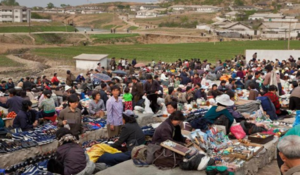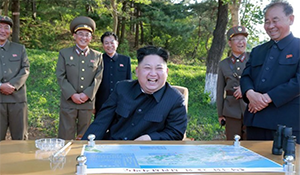Negotiating with the Leaders of the Democratic People’s Republic of Korea: Inferences from Thematic Content Analysis
Negotiating with the Leaders of the Democratic People’s Republic of Korea: Inferences from Thematic Content Analysis Authors: Dr. Bradford Morrison (University of British Columbia) and Dr. Peter Suedfeld (University of British Columbia) Executive Summary The UBC research group assessed psychological processes of six DPRK leaders, including Kim Jong-un, using thematic content analysis for integrative complexity […]
Continue Reading
Assessment of Pathways to Regime Collapse in the DPRK
Assessment of Pathways to Regime Collapse in the DPRK Authors: Dr. Larry Kuznar (NSI, Inc.) and Dr. Sabrina Polansky (Pagano) (NSI, Inc.) This publication was released as part of SMA’s Strategic Outcomes in the Korean Peninsula project. For more information regarding this project, please click here. Introduction and Purpose of Study The collapse of the […]
Continue ReadingKorea Strategic Outcomes
Korea Strategic Outcomes Authors: Lt General (Retired) Robert Elder (George Mason University) and Dr. Alexander Levis (George Mason University) Abstract The GMU Korean Peninsula strategic outcomes project sought viable political-military options to achieve U.S. strategic objectives with respect to the Korean Peninsula, and examined whether executing these options will introduce risk to other regional U.S. […]
Continue ReadingStrategic Multilayer Assessment (SMA) of Strategic Outcomes in the Korean Peninsula- Part 1: Key Findings
Strategic Multilayer Assessment (SMA) of Strategic Outcomes in the Korean Peninsula- Part 1: Key Findings Authors: Dr. Allison Astorino-Courtois (NSI, Inc.) Top-Level Findings This paper reports a number of the top-level findings from the Strategic Multilayer Assessment (SMA) Strategic Outcomes in the Korean Peninsula project requested by the Joint Staff J39 and USINDOPACOM. They are […]
Continue Reading
Western Pacific Regional Dynamics & North Korean Nuclear Status
Authors: Dr. Allison Astorino-Courtois (NSI, Inc.) and Dr. Belinda Bragg (NSI, Inc.) This publication was released as part of SMA’s Strategic Outcomes in the Korean Peninsula project. For more information regarding this project, please click here. Executive Summary Given the current distribution of actor interests, capabilities and resolve (I-R-C), North Korean denuclearization is highly unlikely […]
Continue ReadingComparative Analysis of Kim Family Political Discourse
Comparative Analysis of Kim Family Political Discourse Authors: Weston Aviles (NSI, Inc.) and Dr. Larry Kuznar (NSI, Inc.) This publication was released as part of SMA’s Strategic Outcomes in the Korean Peninsula project. For more information regarding this project, please click here. Executive Summary This study was conducted to address three guiding questions: 1. How […]
Continue ReadingNecessary Conditions For Achieving FFVD Without Militarized Conflict – A Korea Strategic Outcomes Virtual Think Tank Report
[Q3] Under what regional and domestic political, economic, and social conditions would it be possible to achieve final, fully verified denuclearization (FFVD) of the DPRK without resorting to militarized conflict (i.e., what conditions would have had to occur to make that possible)? Author(s): George Popp (NSI, Inc.) and Mariah Yager (NSI, Inc.) This publication was […]
Continue ReadingConditions Conducive to Enforcing a Non-Proliferation Regime in the Asia Pacific Region – A Korea Strategic Outcomes Virtual Think Tank Report
[Q4] Under what regional and domestic political, economic, and social conditions would it be possible to reinforce a non-proliferation regime in the region including extra-regional sales? What conditions would have had to occur to make that possible? Author: George Popp (NSI, Inc.) Summary Response This publication was released as part of SMA’s Strategic Outcomes in […]
Continue ReadingAchieving a Stable Regional Order in the Asia Pacific: What Does the US Need and What Should It Not Negotiate Away – A Korea Strategic Outcomes Virtual Think Tank Report
[Q6] What are the minimum regional and domestic political, economic, and social conditions that are essential for achieving a stable regional order in alignment with US and ally interests? Are there any factors that are sufficient to generate such stability in the region? That is, what should not be negotiated away? Authors: Dr. Belinda Bragg […]
Continue ReadingIs There A Win-Win Scenario for the Key Actors Concerned with the DPRK? – A Korea Strategic Outcomes Virtual Think Tank Report
[Q1] Is there a win-win scenario for all of the key actors (DPRK, ROK, US, China, Russia)? If so, what might this look like? Authors: Dr. Larry Kuznar (NSI, Inc.) and George Popp (NSI, Inc.) Summary Response This publication was released as part of SMA’s Strategic Outcomes in the Korean Peninsula project. For more information […]
Continue Reading